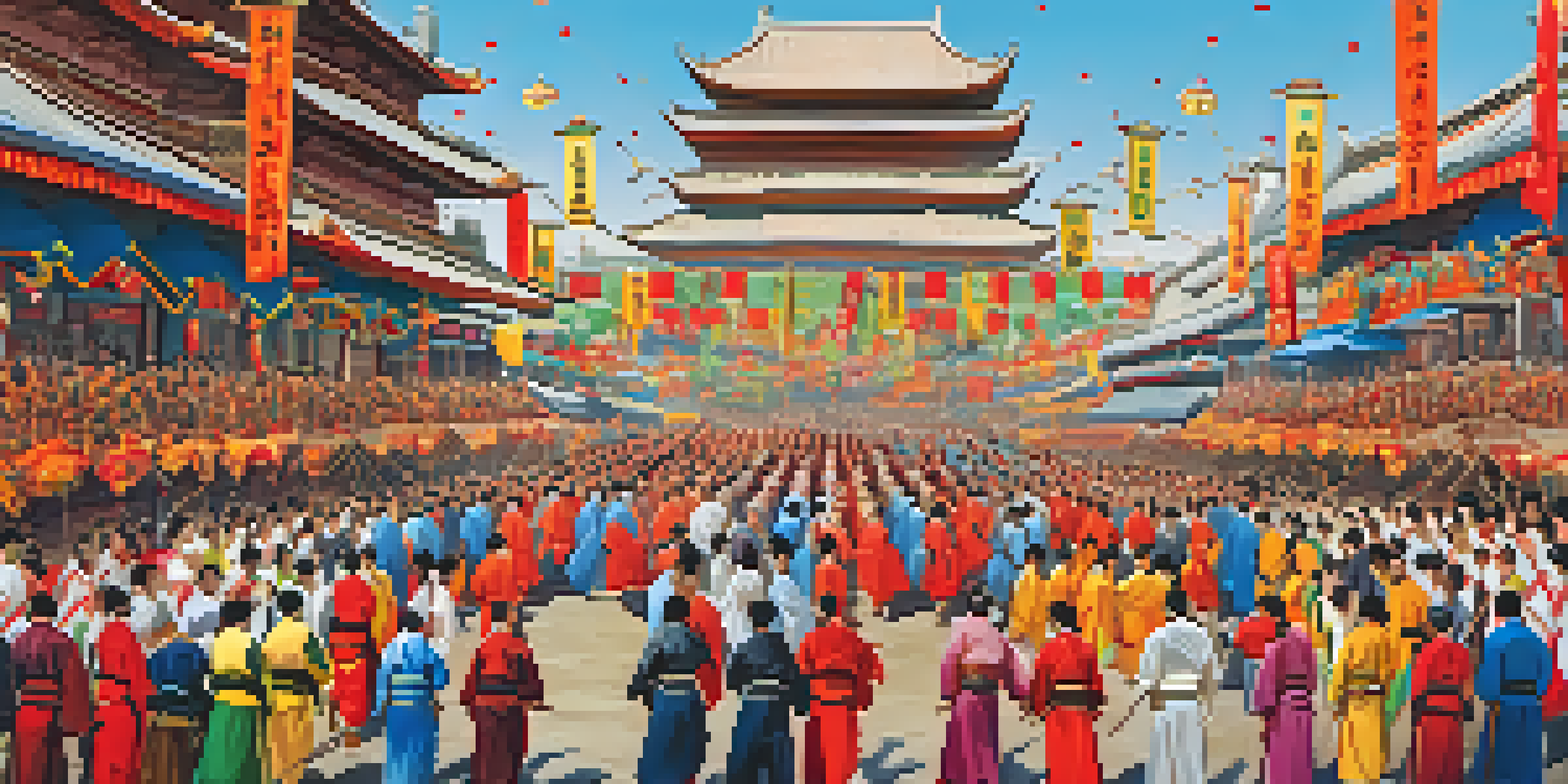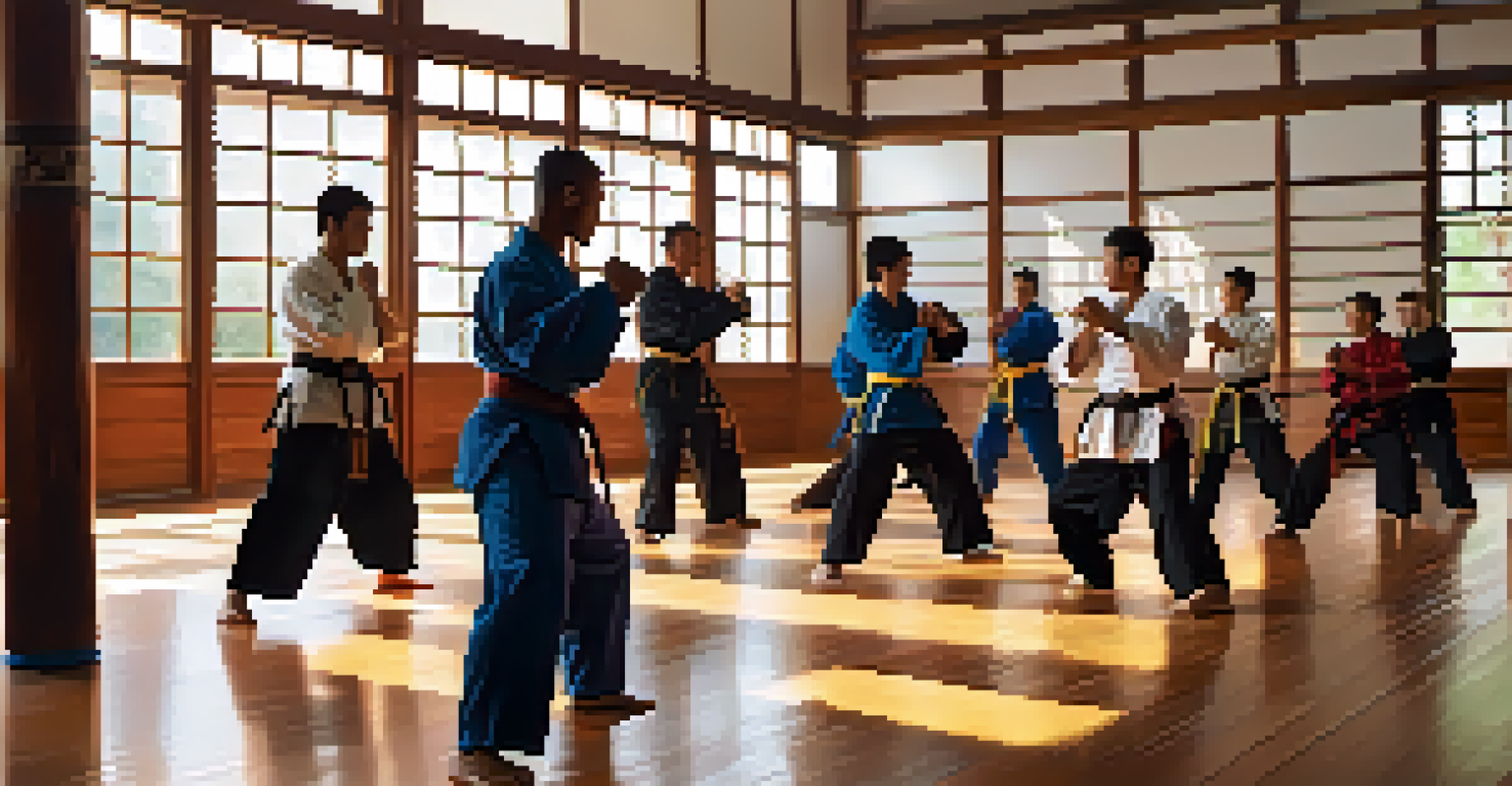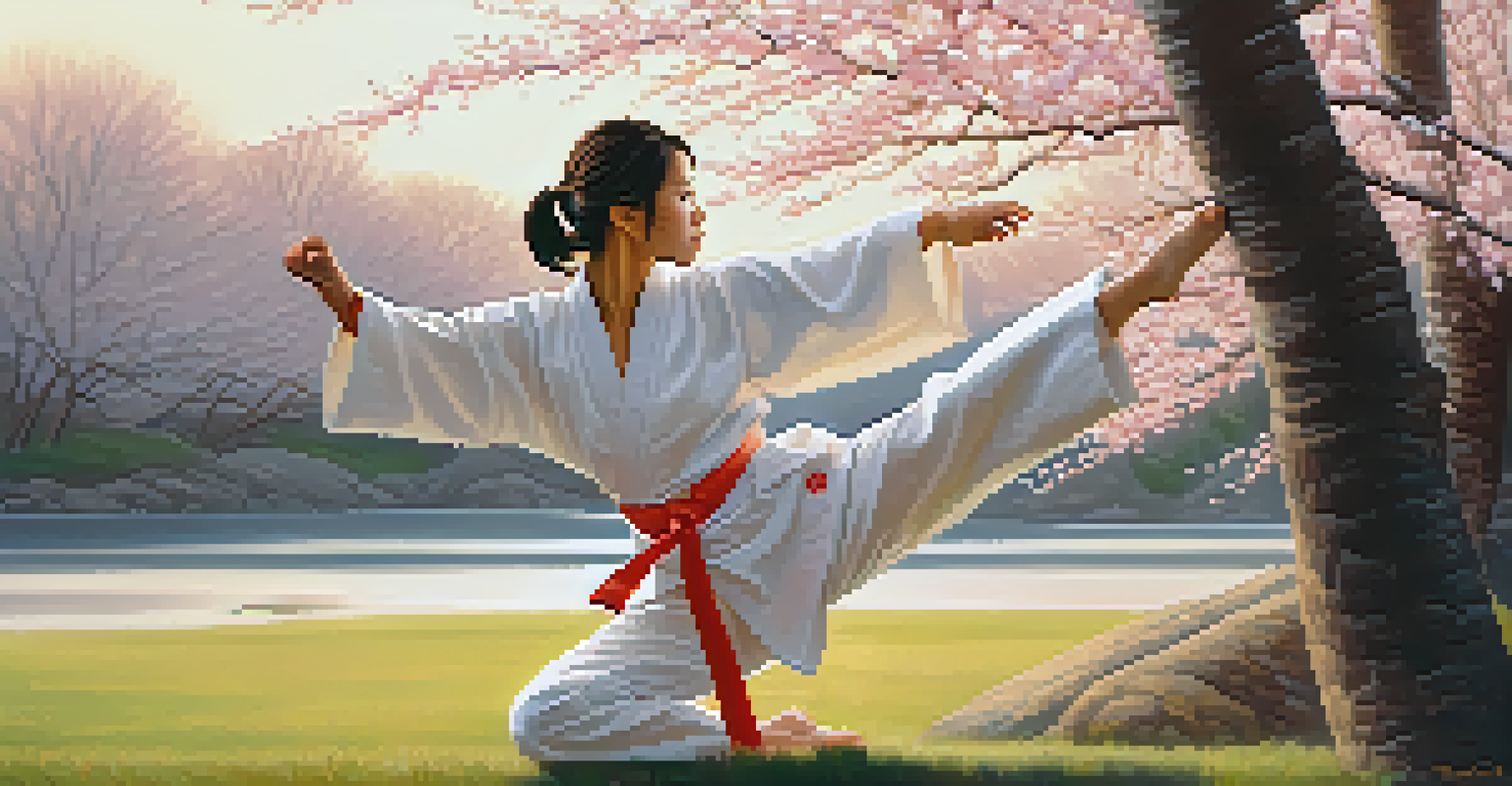Martial Arts as a Tool for Cultural Exchange and Unity

Understanding Martial Arts as a Cultural Connector
Martial arts are not just about physical combat; they're a rich tapestry of culture and tradition. Each discipline carries stories, philosophies, and values that reflect the history of its origin. For instance, karate from Japan is deeply intertwined with Zen Buddhism, emphasizing discipline and respect. This unique blend makes martial arts a powerful medium for cultural exchange, inviting practitioners to explore and appreciate diverse heritages.
The ultimate aim of martial arts is not having to use them.
As people train in different martial arts, they often learn about the cultural significance behind the moves and techniques. This education fosters a deeper understanding of various customs and traditions. For example, Brazilian Jiu-Jitsu emphasizes respect and humility, principles rooted in Brazilian culture. Such insights cultivate a sense of appreciation and respect for other cultures, breaking down barriers and building connections.
Moreover, martial arts schools often attract a diverse group of students, creating a melting pot of cultures. In these settings, individuals share their backgrounds, experiences, and perspectives, enriching each other's understanding of the world. This cultural exchange is not just beneficial for personal growth but also for fostering global unity, as students learn to respect and celebrate differences.
Martial Arts as a Global Language
In a world where language barriers can hinder communication, martial arts serve as a universal language. Practitioners from different countries and backgrounds can connect through shared movements and techniques, transcending verbal communication. This physical expression creates an immediate bond, allowing individuals to collaborate and learn from one another without needing to speak the same language.

Take, for example, international martial arts competitions. Athletes from various countries come together, showcasing their skills while simultaneously sharing their cultures. The atmosphere of mutual respect and camaraderie fosters friendships that often last a lifetime. Participants leave these events not just with medals but with invaluable cultural insights and connections across borders.
Martial Arts as Cultural Bridges
Martial arts serve as a powerful medium for cultural exchange, fostering appreciation and understanding of diverse heritages.
Additionally, social media and online platforms have made it easier to connect with martial artists worldwide. Online tutorials and virtual training sessions allow practitioners to learn different styles from the comfort of their homes. This accessibility encourages a global community where individuals can engage, share experiences, and promote cultural understanding, making martial arts a truly global language.
Martial Arts and Community Building
Martial arts schools often serve as community hubs, bringing together people from diverse backgrounds. These training spaces promote inclusivity, where individuals can share their experiences and support one another. This communal aspect is essential for fostering a sense of belonging and unity, especially in multicultural societies.
Martial arts is not about fighting; it's about building character.
Consider the story of a local dojo that welcomes refugees and immigrants. Through martial arts, these individuals find not only a physical outlet but also a supportive community. As they train together, they form friendships and bonds that bridge cultural divides, showcasing the power of martial arts as a tool for connection and understanding.
Moreover, community events such as demonstrations and open classes allow schools to engage with the public and showcase their diverse student body. These events often celebrate different cultures through performances, food, and traditions, further strengthening community ties. In this way, martial arts become a vehicle for cultural exchange, enriching local communities and promoting harmony.
Promoting Peace Through Martial Arts
At its core, martial arts emphasizes respect, discipline, and self-control. These values are not only essential for training but also for promoting peace within communities. By instilling these principles in practitioners, martial arts can help reduce conflict and encourage peaceful interactions among individuals.
For instance, programs that teach martial arts in schools often focus on conflict resolution and emotional regulation. Students learn to manage their emotions and resolve disputes constructively, reducing instances of bullying and aggression. This approach not only nurtures well-rounded individuals but also fosters a culture of peace and understanding in schools.
Global Language of Connection
Practitioners from different backgrounds connect through martial arts, transcending language barriers and cultivating friendships.
Furthermore, many martial arts organizations actively engage in humanitarian efforts, using their influence to promote peace globally. Initiatives that bring together practitioners from different countries to work towards common goals exemplify how martial arts can serve as a unifying force. Through these efforts, martial arts transcend physical practice, becoming a powerful advocate for global harmony.
Cultural Festivals Celebrating Martial Arts
Cultural festivals that highlight martial arts are vibrant celebrations of diversity and unity. These events often showcase various martial arts styles, allowing practitioners to demonstrate their skills while sharing their cultural backgrounds. For attendees, these festivals offer a chance to witness the beauty of different traditions and learn about their significance.
Take, for example, the World Martial Arts Festival, which attracts participants from around the globe. This annual event features demonstrations, competitions, and cultural performances, creating an immersive experience for everyone involved. Attendees not only enjoy thrilling displays but also engage with different cultures, promoting understanding and appreciation.
Such festivals also foster collaboration among martial artists and cultural organizations, leading to joint initiatives that promote peace and unity. By coming together to celebrate their shared passion for martial arts, individuals from diverse backgrounds find common ground, reinforcing the idea that unity in diversity is possible through shared interests.
The Role of Women in Martial Arts and Unity
Women have played a crucial role in martial arts, breaking stereotypes and promoting equality within the field. As more women take up martial arts, they not only empower themselves but also inspire others in their communities. This shift encourages inclusivity and representation, fostering a sense of unity among practitioners regardless of gender.
Organizations that support female martial artists often create safe spaces for women to train and share their experiences. These initiatives not only empower women but also challenge traditional norms surrounding gender roles within martial arts. As women come together to support one another, they promote a culture of acceptance and unity that transcends boundaries.
Empowering Communities Through Unity
Martial arts schools create inclusive communities that support personal growth and promote peace among diverse individuals.
Moreover, female martial artists have been at the forefront of cultural exchange initiatives, using their platforms to advocate for peace and unity. Through workshops and seminars, they share their skills and knowledge, empowering women from various backgrounds to embrace martial arts. This movement strengthens communities and fosters a global network of empowered women united by their shared love for martial arts.
Future Directions: Martial Arts and Global Unity
As we look to the future, martial arts will continue to play a vital role in promoting global unity. With the rise of technology and online platforms, practitioners can connect and collaborate across borders like never before. This accessibility opens doors to cultural exchange and learning opportunities that were once unimaginable.
Furthermore, as martial arts organizations increasingly embrace inclusivity and diversity, they can foster environments that celebrate different cultures. By offering workshops, seminars, and training sessions that focus on various styles, these organizations can create a global community united by a shared passion for martial arts.

Ultimately, the potential of martial arts as a tool for cultural exchange and unity is boundless. As practitioners continue to come together, share their experiences, and learn from one another, they will contribute to a world that values diversity and promotes peace, making martial arts not just a practice but a movement for global harmony.